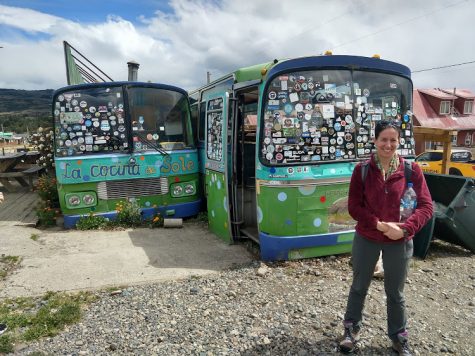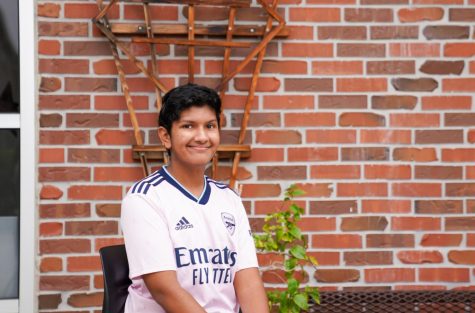A multilingual community
Students and staff reflect on their experiences speaking multiple languages
Matvey Jenssen in Japan. Photo by Maxim Jenssen|Used with permission.
October 16, 2020
French teacher Sarah Finck began her language-learning journey early on by learning Hebrew after school when she was a child. In high school, she began learning French and knew she wanted to teach French as a career. While majoring in French at university, she also audited Spanish.
Finck then spent some time in France before going to China and teaching English there, where she picked up conversational Chinese, acquiring her fifth language. For her, language learning is a passion.

“In high school, I enjoyed my French classes — I like the analytical part of the grammar, putting ideas together and [the] communicative part of how it opens up other parts of the world to you,” Finck said. “[Learning languages] was something that fascinated me in the same way that some people might be fascinated by computer code or engineering or historical movements or whatever — it’s something that I like.”
Like Finck, sophomore Kyle Wong understands five languages. He grew up bilingual, speaking English and Cantonese fluently. Later, he learned Mandarin Chinese, German and Spanish and he practices these languages by speaking each of them at least once a week. He finds being multilingual useful since he can speak these languages when he travels around the world. It has also benefited him when playing for his soccer team, as some of his teammates can speak Spanish and German.

Previously, junior Matvey Jenssen lived in Germany and Russia, where he learned to speak those two respective languages and some English from his elementary school. He then moved to California and continued learning English. Currently, he is learning Chinese at MVHS.
Because of her knowledge of different languages, Finck feels she can more easily adapt to other cultures. She also believes knowing languages had made her more open-minded and empathetic.
“I think that I can code-switch culturally, so if I am interacting with French people, then I understand behaviors and ways of speech and ways of thinking that are associated with their language and culture,” Finck said. “I’m able to adapt myself to different contexts. I don’t know that my American self is different because of knowing French; I’d like to think that from my time traveling and living in other countries and living in proximity to people from other places but I’m increasingly tolerant and accepting of other people’s struggles to express their ideas in English if they started with another language, or just that I can see the richness and diversity in the world, and appreciate what another language skill can bring to someone’s skill set.”
Jenssen enjoys learning languages and has traveled to Italy and Japan, he is considering learning Italian or Japanese next. He claims learning languages is beneficial.

“[Learning] multiple languages is fun because you get opportunities for your future, but it’s also developing your mind,” Jenssen said. “For example, when I speak in Russian, I try to think more in Russian. But when I talk in Chinese, I try to think more in Chinese, which I’m currently trying to develop right now in a more advanced way.”
Wong also recommends MVHS students learn. Although English is the most common language on the internet he thinks it is helpful for people to learn multiple languages.
“[Learning] either Spanish or Chinese because both of those have probably the largest amount of people that know how to speak them, so it probably is the most [useful],” Wong said. “English might be a universal language, but [it is] always good to learn different languages, and I’ve heard it’s good for the brain.”

Finck agrees with Wong and recommends others to endeavor on their language-learning journey. She has formed many relationships with others due to her language skills and has also traveled while experiencing different cultures. Finck believes being multilingual can help people understand others and learn about different places.
“I think that Americans in particular, should not assume that everyone else is going to learn English for them,” Finck said. “One reality is that people worldwide are learning [English]. [However, learning other languages] can open your eyes to other cultures, and let you see the struggles that other people have and not assume that you’re better than them because you speak English.”


















